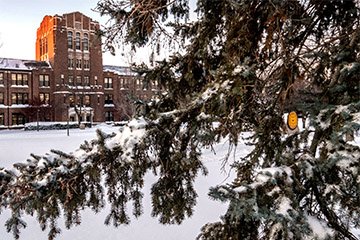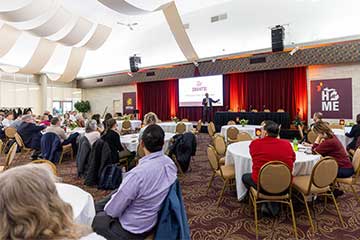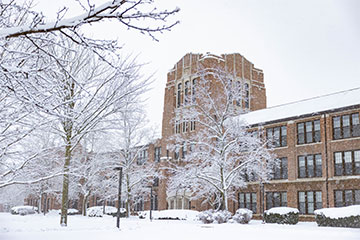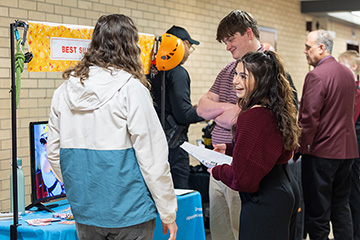Summer adventures in brain science
Students from several academic disciplines collaborate to explore neurological activity
Many Central Michigan University students say they are pursuing a degree to help them gain the knowledge, skills and experience to make a positive difference in the world — to improve the lives and wellbeing of their friends, family and neighbors.
For the past several summers, undergraduate and graduate students working in the lab of Dr. Ute Hochgeschwender have had the opportunity to do just that through the National Science Foundation’s NeuroNex program.
In Hochgeschwender’s bioluminescent optogenetics lab, this team is participating in research that focuses on how biological light can be used to influence activity in the brain. The data they collect may contribute to therapies and treatments for a wide range of neurological issues, including disorders like autism and diseases like Huntington’s.
As part of the program, the student researchers receive a generous stipend to cover their expenses, allowing them to focus intently on their work in the lab. Each is given responsibility for a project related to their area of academic interest that also provides an opportunity to expand their knowledge and skill set. All the student work contributes to the lab’s overall research mission.
And whether it’s crunching data, analyzing images or recording neural activity – their work plays an important part in understanding how to improve brain function and health.
“No matter what you do, you can be working for the greater good,” Hochgeschwender said. “In our weekly discussions, we are able to link the things we do in the trenches of basic research back to the bigger picture in the context of neuropsychiatric diseases.”
The 2022 summer research team
This year, the lab team includes a high school senior and several graduate students and undergraduate students. Read on to learn a little more about a few of them:
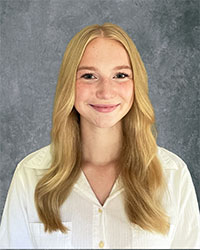 Lily McLean
Lily McLeanMajor: Neuroscience
McLean said she’s excited to know that the work she has done in Dr. Hochgeschwender’s lab could lead to help for individuals struggling with brain and spinal injuries.
“The work I’ve done in the lab has actually changed my future course of study. I would love to continue this research next semester and next year. I want to just continue nurturing my coding skills and nurturing my skills as a scientist.”
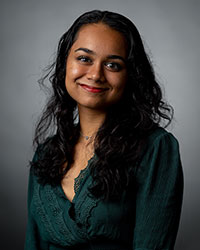 Jeel Patel
Jeel PatelMajor: Neuroscience
Patel said the experience has given her the chance to study drugs and technologies currently being used to help patients, and knows the research she’s doing now could significantly impact how those people are treated.
“As a pre-med student, I think it's a good opportunity to see different aspects of medicine. If I do become a doctor, it's kind of cool to see from one end to the other end — not just prescribing medicine, but also studying the medicine and studying the neurons and that kind of stuff.”
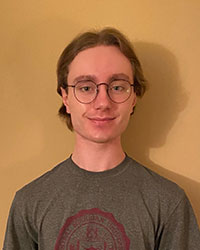 Grant Folkert
Grant FolkertMajor: Neuroscience and Philosophy
Folkert said the lab has been one of the best environments he has worked in, and that it provided his first opportunity to work on scientific programming involving statistical analysis of large data sets.
“The fact that I know several programming languages for statistics and data analysis now is going to help me in a lot of different fields…I have a much better understanding of neuroscience, research, literature and basic research and how it functions.”
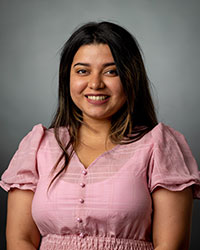 Anusha Uprety
Anusha UpretyMajor: Neuroscience and Psychology
Uprety said working in the lab allowed her to combine her two academic interests, neuroscience and psychology, in a way that mimics the careers she hopes to pursue in the future. It also gave her the chance to learn more about herself, she said.
“When I’ve worked in labs before it was mostly observing, which was understandable, but I’ve been enjoying the freedom to do things my way and finding out what works best for me.”
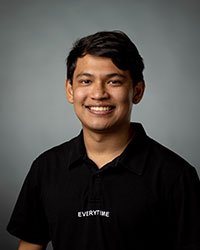 Shashwat Maharjan
Shashwat Maharjan
Major: Mechanical engineering
Maharjan said he had never taken a computer science class before — he learned how to code through hands-on experience and supervision in the lab. He’s also given presentations to distinguished scientists and professionals from other organizations. These new skill sets will make him more attractive to future employers, he said.
“I recently had an interview for next summer and told the person about all of the things that I'm doing here right now. She said, ‘that's exactly the person that we need to do this stuff.’”
Real world research, real world experience
“Reading about research or even doing structured experiments in a classroom lab setting are not the same as research,” Hochgeschwender said. “Students should really experience what it is like to actually do the research in a laboratory setting.”
Some students will learn that research is not something they wish to pursue, while others will discover a true passion for the process — and either outcome is a positive one, Hochgeschwender said.
Many academic areas provide opportunities to participate in hands-on research, and Hochgeschwender strongly encourages students at the undergraduate level to seek them out.
“Some students may feel timid; they may think you can’t ask a professor to do work in their labs, but you absolutely can,” she said. “You not only can, you should ask them; that is what they are here for – that is part of their mission.”
Not only will students gain important professional experience, Hochgeschwender said they also will practice the critical thinking and problem-solving skills employers seek.
“They have to get ready for a really competitive world out there, and we try to provide them a good foundation to prepare,” she said.
Related News
View News HomeSearch begins for facilities management leader
February 11, 2026
President MacKinnon: Apply now for 2026 Go Grants
February 10, 2026
Facilities Management AVP to step down
February 10, 2026
The week in photos: February 2-8
February 10, 2026

